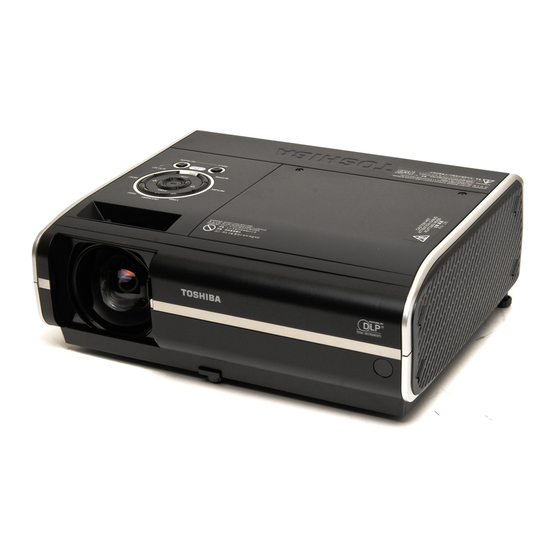Toshiba TDP-EX20U - Short Throw DLP Projector Manuel du propriétaire - Page 33
Parcourez en ligne ou téléchargez le pdf Manuel du propriétaire pour {nom_de_la_catégorie} Toshiba TDP-EX20U - Short Throw DLP Projector. Toshiba TDP-EX20U - Short Throw DLP Projector 50 pages. Toshiba tdp-ex20u: specifications
Également pour Toshiba TDP-EX20U - Short Throw DLP Projector : Spécifications (2 pages)

Using the Network Utility
Displaying a computer's screen via the projector
1
Launch the Network Utility
software application.
When the Network Utility launches, the Screen
Image transmission mode window appears on
the computer screen.
To switch to the Screen Image transmission
mode window from another mode, click on the
Screen Image icon
.
Select Transmission mode.
2
Click on Update automatically or Update manually. See step
Update automatically and Update manually.
3
Click on the Advanced button.
The Screen Image: Advanced Settings dialog
appears. Set the dialog as shown below, as
necessary.
•
Interruption
Check the No Interruptions checkbox to
prevent other computers from interrupting the
projector, for example, during presentation.
•
Window Display
Select the Place in Tasktray at the start
of transmission checkbox to iconify the
Network Utility and place it in the computer's
tasktray when transmission initiated.
To display the window, double click on this
icon, or right click and select Open from the
popup menu. Even with the Network Utility
window minimized, you can use the pop-
up menu to stop or resume transmission as
4
described in step
and later.
•
Transmission Mode (Image)
Selecting High quality improves the
quality of the projected image, but lowers
communication speed. Selecting High speed
has the opposite effect.
•
Transmission Mode (Sound)
Check the Transmit sound to a projector
(Only when connected with one projector) checkbox to transmit the sound being
played on a computer to the projector.
Note: The sound can be sent when only one projector is selected.
6
for the meanings of
64
Select the screen image you wish
4
the projector to display.
Select Desktop
The computer screen image is transmitted as-is.
Select application window
Select a running application (e.g. Microsoft
®
PowerPoint
), and send that application's
window only.
The desktop and a list of running applications are displayed.
Select the desired application from this list. (If the desired
application is not on the list, launch it. Note that if too many
applications are running, it will consume the computer's
resources, which could slow communication speed.)
5
Select the projector to be
transmitted.
The IDs of projectors accessible for transmission
will be listed. (When a projector name is set,
that name appears instead of MAC address.)
Select the checkbox of the projector you wish
to transmit to from this list. Then icon
displayed on the projector's screen for a few
seconds.
It is possible to select up-to four projectors.
Click on the
button.
6
When "Update automatically" is selected in step
Screen images are sent consecutively after the
the sound being played on a computer can be sent to the projector.
When "Update manually" is selected in step
A single screen image is sent when the
To halt transmission from Update automatically, click on the
7
button.
If the Network Utility icon has been placed in the tasktray, double click on the icon
to display the window, then halt transmission, or right click on the icon, and halt
transmission.
Notes
•
It may not be possible to transmit the images from movie player or other video applications.
•
When using "Update automatically", the transmitted image refresh rate depends on the
performance of the computer you are using and the surrounding radio wave environment.
•
The projector screen may have a few differences from the computer screen.
•
If you selected application window in step
image may not be correctly displayed by the projector.
•
The projector ID is the MAC address of the wired LAN inserted into the projector.
•
Playing contents protected by copyright is not supported.
®
is
2
button is clicked. Besides,
2
button is clicked.
4
, if that application is not active (in use), the
65
